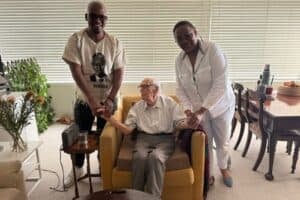Fikile Mbalula – who variously styles himself on social media as Mr Fix, Mr FearFokol and Razzmatazz – is very keen on collective guilt, um, responsibility.

As popular idiom has it, “success has many fathers, failure is an orphan”.
Or, as some popular idiots would have it, South Africans must take “collective responsibility” for the failures of their leaders. That’s the latest refrain from President Cyril Ramaphosa’s administration, presumably because blaming everything on apartheid is beginning to wear thin.
It seems the preferred solution is to spread the blame more evenly and more widely than just targeting whities. Niftiest of all, if it works, is that it would mean ordinary citizens would voluntarily be taking on the crippling responsibilities that their leaders are shrugging off.
Fikile Mbalula – who variously styles himself on social media as Mr Fix, Mr Fearfokol and Razzmatazz – is very keen on collective guilt, um, responsibility.
One of the loads that Mbalula would like to drop is culpability for the failure of his government to control the lawless minibus taxi sector. Last week, outlining what’s to be done about the festive season’s road accident carnage, Mbalula explained: “We must all appreciate that safety on our roads is a collective responsibility that we must all shoulder.”
No doubt already feeling wonderfully lighter, Mr Fix then turned to the nettlesome problem of torched commuter trains, which have cost the Passenger Rail Agency R636 million in the past three years. Not my problem, says Razzmatazz.
“The duty to improve our rail service is a collective one,” he tweeted last week. The “organs of civil society … must champion the fight against criminality”.
Pravin Gordhan, minister of public enterprises, has been quick to pick up the baton. This past Sunday, he issued a statement saying that it is our “collective responsibility” as South Africans to support SAA in its efforts to restore confidence among its customers and rebuild revenues in the shortest possible time.
He neglects to mention that it may come with a substantial cost. Despite the warnings of the unions that the planes are safety risks, having been patched with pirate parts, as well as that several travel groups and insurers will no longer guarantee the tickets.
Gordhan is unperturbed. While the government won’t actually step in to underwrite your dodgy purchase, it is, however, willing to toss in a few billion towards a business rescue. But “we reassure customers and encourage them to buy tickets with confidence”.
The Democratic Alliance’s Geordin Hill-Lewis, the party’s shadow finance minister, has rejected this. Rather, he said: “The public could force SAA into closure in a matter of days, by simply refusing to fly on it, so that it can be wound up and sold off.”
The only kind of collective responsibility that the ANC is not prattling on about is the traditional kind. The Ramaphosa faction is not eager to take responsibility for turning a blind eye to state capture. The Cabinet slithers away from collective responsibility for its non-performing ministers. And the ANC itself won’t take collective responsibility for allowing its thieving and incompetent cadres deployed to the top jobs.
It’s not only an ANC problem. There is unfortunately also the electorate’s collective responsibility for letting these crooks get away with it.
In the spirit of New Year resolutions, may I recommend to Ramaphosa and his crew a daring alternative to the “collective responsibility” of SA’s citizenry.
It comes from a US president, Harry S Truman, who had this sign on his desk: “The buck stops here.”
William Saunderson-Meyer.
For more news your way, download The Citizen’s app for iOS and Android.
Support Local Journalism
Add The Citizen as a Preferred Source on Google and follow us on Google News to see more of our trusted reporting in Google News and Top Stories.








